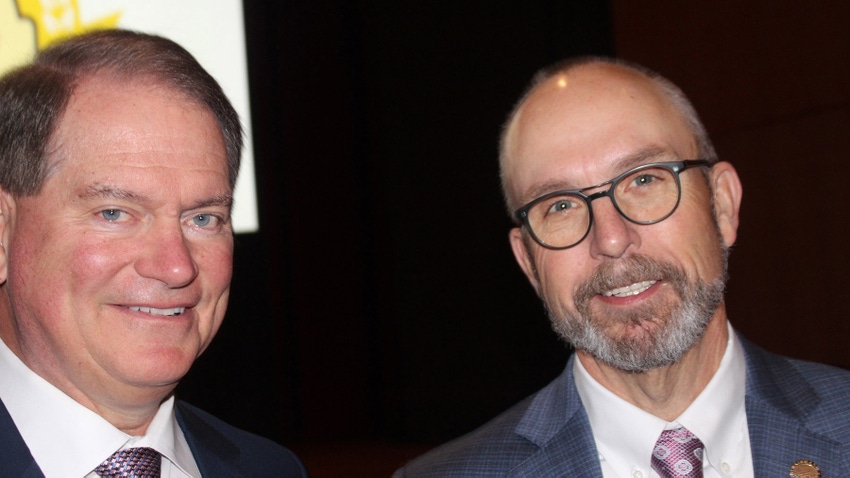March 13, 2023

The National Cotton Council is gearing up for a difficult – and possibly lengthy – effort to pass a new farm bill that will provide meaningful assistance for the U.S. cotton industry and its producers.
Shawn Holladay, a cotton producer from Texas making his first speech as the newly elected NCC chairman, outlined how the farm bill process may play out during the Mid-South Farm and Gin Show in Memphis, Tenn.
“While the National Cotton Council continues to be involved on a number of fronts ranging from trade to environmental issues, priority number one for 2023 will be the development of the new farm bill,” he said.
“This year’s crop is the final one covered by the 2018 farm bill (the Agriculture Improvement Act of 2018), and work is underway in Congress on the 2023 farm bill. The Council’s Farm Policy Task Force continues its work of finalizing the industry’s priorities for the new farm law.”
Challenging environment
Holladay said the NCC anticipates a challenging environment both from a budget perspective and the number of new members of Congress. Seven senators and 79 members of the U.S. House of Representatives are in their first terms. Nearly half of the members of the House Ag Committee have never voted on a farm bill.
“Our overarching message will be that the overall structure of the 2018 farm bill has served the industry well, but the surge in production costs has reduced the effectiveness of the current safety net,” Holladay said.
“The ag committees need additional budget resources in order to provide the programs that can effectively address the costs and risks that we face both on the farm and throughout the supply chain.”
The costs of some key crop inputs nearly doubled in 2022 – specifically fertilizer and some herbicides – and have not come down much since then. The formula and reference prices for calculating the Price Loss Coverage or PLC program payments many cotton and rice producers rely on have not been updated since the 2014 farm bill.
Safety net
The efforts by the NCC and other farm organizations to improve the safety net provisions in the new farm bill may be complicated by House Speaker Kevin McCarthy’s pledge to freeze discretionary spending at Fiscal Year 2022 levels. But McCarthy’s district, which is centered around Bakersfield, Calif., includes a number of Pima cotton and other specialty crop producers.
U.S. Department of Agriculture data indicates cotton costs of production increased by $160 per acre between 2018 and 2022. That equates to an additional 20 cents in costs per pound based on an average yield of 800 pounds per acre. For 2023, costs are expected to range between 90 cents and $1 per pound with futures trading in the mid-80s.
Between 2018 and 2022, Congress and the Trump and Biden administrations provided about $17 billion per year in additional assistance through programs designed to address market volatility, supply chain disruptions and extreme weather events.
This assistance was on top of the support provided under the 2018 farm bill, which industry leaders believe was “fairly modest. That level of additional funding should be a guide for the resources that should be added to the commodity and crop insurance titles of the new farm bill,” they said.
Trade issues will also be top-of-mind for the industry. “In the past year, Council staff and our leadership have pushed back on efforts to undermine the trade relationships with CAFTA-DR and USMCA partners,” Holladay said.
“The two-way trade of cotton, cotton yarns, fabrics and textile products within the Western Hemisphere is critical to the health of our domestic textile industry. We will continue to work to preserve the beneficial provisions of those agreements.”
Trade relationship
The NCC will also continue to monitor the overall trade relationship between the United States and China, whose mills remain an important export customer for the U.S. cotton industry. China also exports a significant amount of cotton textile and apparel products to the United States.
“Those products coming into the U.S. are now under increasing scrutiny by U.S. Customs and Border Protection due to legislation implemented in 2022 designed to address the importation of goods suspected of being produced with forced labor. As a result, we are seeing shifts in the sourcing of textile products as supply chains adjust to the new law.”
Holladay said the economic impacts of the COVID pandemic are still being felt in the industry. “We continue to support actions to help address supply chain logistics impacting both exports and the availability and cost of crop production inputs. In addition, we must preserve our industry’s status as a timely mover of quality U.S. cotton to customers worldwide.”
Industry participation
Strong industry participation will be needed for the NCC to meet its challenges in 2023, he noted, adding that membership in the Council reached an all-time high of 82 percent when last surveyed in 2021.
“Many of you know that Julia and Katie and I have farmed out in Nelson County, south of Lubbock, Texas, all of our lives,” he said. “It is truly a family operation. We have five employees that have been with us for a long time. One of them my father hired when I was eight years old, and he still checks water wells.
“We’re passionate about what we do for a living, and we’re passionate about the people we work with. The fact you’re sitting in these seats today reflects how important you think this industry is because you've taken the time to be here. And I would encourage you to show up, to support your organizations, to be there when you're needed and help someone else be there. Be part of the solution.”
About the Author(s)
You May Also Like






